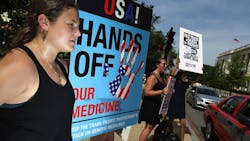TPP Trade Talks Focus on Auto, Drug Patents and Dairy Concerns
ATLANTA -- Talks on the ambitious Trans-Pacific Partnership remained stuck on a handful of tough issues including auto parts and drug protections as trade ministers moved to a second day of negotiations Thursday.
Under heavy pressure to clinch a deal this week after key differences couldn't be bridged in their July meeting in Hawaii, top officials from the United States, Japan and 10 other Pacific Rim countries were negotiating around the clock in this southern U.S. city.
The representatives of the 12 countries -- Australia, Brunei, Canada, Chile, Japan, Malaysia, Mexico, New Zealand, Peru, Singapore, the United States and Vietnam -- were seeking to complete talks this week that would form the world's largest free trade region, its members comprising about 40% of the global economy.
But major challenges in three areas remained, according to officials involved in the discussions:
- Meeting pressure from Japan to remove U.S. barriers on auto parts imported from non-TPP countries, against resistance from Mexico and Canada, already major favored suppliers of parts to the U.S. auto industry under the NAFTA trade treaty
- Opening up the Japanese, U.S. and Canadian markets to rival dairy and processed dairy products from New Zealand and Australia
- Extending patent protection for increasingly important biologic drugs to eight years, amid concerns this will raise the costs of the drugs and leave them less accessible in poorer countries
At the end of the first day of ministerial talks Wednesday, negotiators remained mum about the progress on these key issues amid hope that an agreement could be reached.
The stakes were high for many, with farm and pharmaceutical industry lobbyists from various countries and civil society activists gathered at the same Atlanta hotel to defend their interests.
And as the ministers began meeting Wednesday, a handful of protestors marched through the lobby of the hotel chanting "No TPP! Stop Corporate Greed."
Meanwhile a senior U.S. senator warned that Congress could refuse to ratify a deal if it does not protect the interests of U.S. businesses and workers.
"No one -- at least no one from our side of the negotiations -- should be in a hurry to close talks if it means getting a less-than-optimal result for our country," said Republican Senator Orrin Hatch in a statement.
"If the agreement falls short, I will not support it."
While there is no deadline on the negotiations, time was a clear source of pressure.
Since initiating the talks in 2008, the United States has been hoping to lock in rules on free trade and intellectual property protection that global trade heavyweight China would eventually have to heed. China, however, has already begun trying to set up its own Asia trade agreement, which analysts worry could take concrete shape if TPP talks fail.
Moreover, Washington wants a deal soon to avoid having to ratify it at the height of the 2016 presidential and congressional election campaigns.
The negotiations have covered a range of issues, from governments' protection of state-owned enterprises, to setting up extraterritorial tribunals to settle disputes between governments and foreign investors, to the use of capital controls in a country's financial system.
Activist groups say the secretiveness of the discussions masks an effort that will benefit businesses while costing the people of the countries involved.
A small protest outside the hotel where the TPP talks were taking place took aim at the drug patent protection issue. Lengthening the protection from the widespread standard of five years to eight years, said the Washington group Public Citizen, "would reverse the past U.S. approach, which allowed poorer countries more flexibilities permanently to ensure their populations had access to affordable medicines."
By Paul Handley
Copyright Agence France-Presse, 2015
About the Author
Agence France-Presse
Copyright Agence France-Presse, 2002-2025. AFP text, photos, graphics and logos shall not be reproduced, published, broadcast, rewritten for broadcast or publication or redistributed directly or indirectly in any medium. AFP shall not be held liable for any delays, inaccuracies, errors or omissions in any AFP content, or for any actions taken in consequence.
